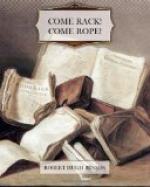As he came up the broken ground on to the crest of the hill, he saw Anthony come out of the yard-gate and the yeoman with him. Then Anthony mounted his horse and rode down towards him, bidding the man stay, over his shoulder.
“It is all plain enough,” shouted Anthony loud enough for the man to hear. “It is Dethick that must pay. You need not come up, Robin; we must do the paying.”
Robin checked his mare and waited till the other came near enough to speak.
“Young Thomas FitzHerbert is within. He is riding round his new estates,” said the other beneath his breath. “I thought I would come out and tell you; and I do not know where we can talk or dine. I met him on the road, and he would come with me. He is eating his dinner there.”
“But I must eat my dinner too,” said Robin, in dismay.
“Will you tell him of what you have told me? He is safe and discreet, I think.”
“Why, yes, if you think so,” said Robin. “I do not know him very well.”
“Oh! he is safe enough, and he has learned not to talk. Besides, all the country will know it by Easter.”
So they turned their horses back again and rode up to the farm.
* * * * *
It was a great day for a yeoman when three gentlemen should take their dinners in his house; and the place was in a respectful uproar. From the kitchen vent went up a pillar of smoke, and through its door, in and out continually, fled maids with dishes. The yeoman himself, John Merton, a dried-looking, lean man, stood cap in hand to meet the gentlemen; and his wife, crimson-faced from the fire, peeped and smiled from the open door of the living-room that gave immediately upon the yard. For these gentlemen were from three of the principal estates here about. The Babingtons had their country house at Dethick and their town house in Derby; the Audreys owned a matter of fifteen hundred acres at least all about Matstead; and the FitzHerberts, it was said, scarcely knew themselves all that they owned, or rather all that had been theirs until the Queen’s Grace had begun to strip them of it little by little on account of their faith. The two Padleys, at least, were theirs, besides their principal house at Norbury; and now that Sir Thomas was in the Fleet Prison for his religion, young Mr. Thomas, his heir, was of more account than ever.
He was at his dinner when the two came in, and he rose and saluted them. He was a smallish kind of man, with a little brown beard, and his short hair, when he lifted his flapped cap to them, showed upright on his head; he smiled pleasantly enough, and made space for them to sit down, one at each side.
“We shall do very well now, Mrs. Merton,” he said, “if you will bring in that goose once more for these gentlemen.”
Then he made excuses for beginning his dinner before them: he was on his way home and must be off again presently.




